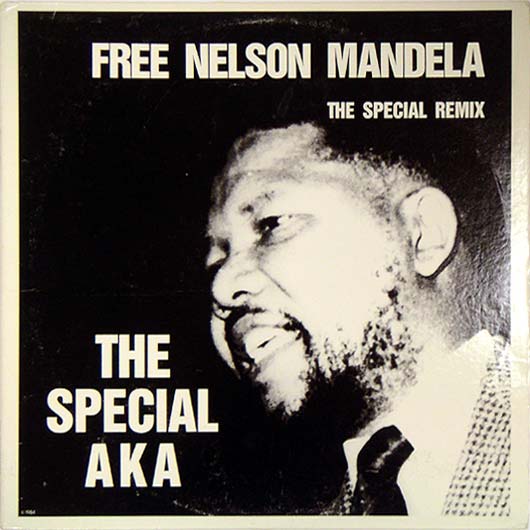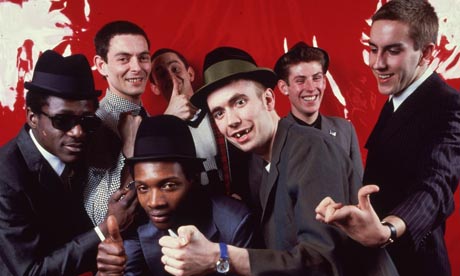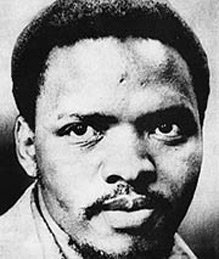Free

Free Nelson Mandela
Free free
Free free free
Nelson Mandela
Free Nelson Mandela
21 years in captivity
Shoes too small to fit his feet
His body abused, but his mind is still free
You’re so blind that you cannot see
Free Nelson Mandela
Visited the causes at the AMC
Only one man in a large army
You’re so blind that you cannot see
You’re so deaf that you cannot hear him
Free Nelson Mandela
21 tears in captivity
You’re so blind that you cannot see
You’re so deaf that you cannot hear him
You’re so dumb that you cannot speak
Free Nelson Mandela
– The Specials in 1983
I was driving over to Willow to raise a glass to the anniversary of the restored right to raise a glass when I heard the news. Prisoner and President Nelson Mandela took his leave of us yesterday, at the ripe old age of 95.
Rest in peace, Mr. President. He may be the last of the giants to depart from the great struggle against a colonial past. We are left with political midgits.
I remember when his heroic struggle against oppression burst into my consciousness. It must have been ’84. I was in Hawaii then, stationed at the numbered Fleet Headquarters that was then located on Ford Island, in the middle of Pearl Harbor.
It was a little surreal, being surrounded by all that history, and thus the time on the island within an island has a special part in the cavalcade of memory.
My pal Agent had just reported to the staff, and one of our jobs was to prepare the morning intelligence update for the Admiral in Command. Much of it was nothing more than a classified version of the news- it was great fun putting it together to tell a story- but it was also plodding work, putting together the Vu Graphs to accompany the presentation.
We were not Power Point Rangers in those days, and with the restrictions on recording devices, we were limited to an AM/FM radio down in the Secure Compartmented Information Facility where we labored. We preferred harder alternative rock, but KSSK with morning jock Hal Lewis- a haole whose stage persona was J. Akuhead Pupule- would take us on a romp through the curious nature of local politics in Paradise.
Aku, as he was affectionately known, was not long for this world. He was a connection back to the days of the Hawaiian territory; islands seized by local planters and an expansionist America determined to gain coaling stations for the Fleet and becoming a Pacific power.
It could have gone another way. Queen Liliokulani would have preferred to keep her throne, perhaps as an overseas dependency of the British Empire, like South Africa. The state flag to this day includes the Union Jack as a point of reference about the vagaries of history.
The world of the Pax Brittanica was just about gone, though things continued to crash around in the attic of Empire. The Crown Jewels were gone. Rhodesia had gone grudgingly, in 1979. The tiny Falkland Islands had required the last gasp of the Royal Navy’s prestige in 1982 to save them from humiliation of forced occupation by the Argentinians.
Only the white separatists of South Africa stood their ground with Afrikaner stubbornness against the winds of change and justice.
At the time I was in the Islands, the far away pressure on the Apartheid regime in Pretoria was mounting. It did not have much to do with us, or our mission, but there was a song that personalized the struggle: “(Free) Nelson Mandela.” It was catchy, and made your feet move, and it became our theme-song for the preparation for the morning brief, and we would sing it before picking up our slides and heading up stairs to talk about the estimated locations of Soviet Ballistic Missile submarines on patrol, and how we might destroy them in a timely manner should events require us to do so.

(The Specials in 1980. Jerry Dammers is pictured third from right, and his smile is legendary. Photo: Keystone/Hulton Getty).
Jerry Dammers wrote the song that left-of-center magazine “The New Statesman” listed as one of the “Top 20 Political Songs” of all time.
When Dammers started on the joyful brass riff and African-inspired melody, he later said he didn’t actually know much about Nelson Mandela. The icon of those days was martyred Steve Biko, murdered by South African authorities in 1977. Dammers was an activist of the ‘60s school: he had joined the demonstrations against the Springboks, the South African Rugby team during their tour of the UK in 1969.

(Steve Biko. Photo Wikipedia).
The African Sounds festival at Alexandra Palace Pavilion, north London, in 1983 changed all that. The twelve-hour event was timed to celebrate the imprisoned ANC leader’s sixty-fifth birthday. “Free Mandela,” chanted the crowd and South African trumpeter Hugh Masekela’s blasted out the music. “Free Mandela.”
It was the 1995 embrace of the largely white Springboks that cemented Nelson Mandela’s reputation for conciliation and forgiveness against his one-time oppressors.
To this day I cannot hear the sound of that tune without wanting to dance. The band was The Specials, who also had some other iterations, and they specialized in an ironic take on the mod dress of the 1960s- think porkpie hats and mohair suits- and harnessed the power of danceable ska with a rock-steady beat and a certain snide punk attitude.
It summed up a lot of us, in the day, though perhaps distinct minority in Naval Intelligence. The tune and the lyrics were infectious, and the cause was just.
I won’t try a eulogy for a political and social giant. I will leave that to those with better credentials than mine. But I could not pass this morning without mention of him, and for my admiration of his life, and the accomplishments of one man against an oppressive state.
Mr. Obama lifted the words of Secretary of War Edwin Stanton, on the passing of Mr. Lincoln to describe the gravity of the event. “He no longer belongs to us, he belongs to the ages.”
He is in good company. Nelson Mandela is free now, free for eternity.
Copyright 2013 Vic Socotra
www.vicsocotra.com
Twitter: @jayare303
